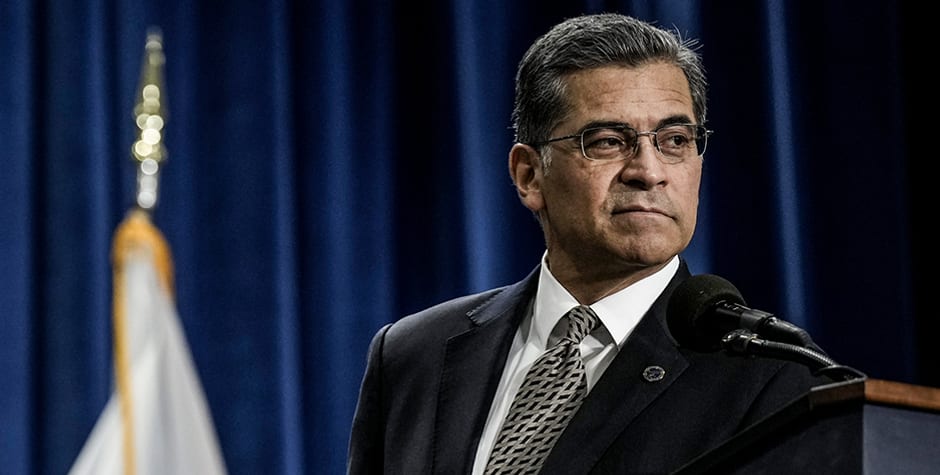Becerra's HHS: Undermining the Rights of Conscience
This week, the ACLJ filed formal comments with the Department of Health and Human Services in opposition to its proposed regulation “Safeguarding the Rights of Conscience as Protected by Federal Statutes.”
Why would the ACLJ oppose anything that purports to safeguard the rights of conscience? After all, the ACLJ has previously submitted comments with HHS in support of rules protecting conscience rights. It has filed numerous lawsuits in support of the conscience rights, such as on behalf of the Philadelphia pediatrician who was fired for refusing to dispense emergency contraception and business owners who didn’t want to kowtow to the HHS abortion pill mandate. The ACLJ submitted amicus briefs with the Supreme Court in support of a rule protecting the religious and moral convictions of religious groups like the Little Sisters of the Poor.
The reason the ACLJ has filed comments objecting to “Safeguarding the Rights of Conscience as Protected by Federal Statutes” is because the proposed rule does nothing of the sort.
When HHS first announced the proposed rule on December 29, 2022, one didn’t need to begin reading the rule’s bureaucratic gobbledygook to know what it was going to say. HHS is under the leadership of Secretary Xavier Becerra, the most pro-abortion ideologue ever to hold that position. As a congressman for 24 years, Becerra had a 100% rating on his voting record from Planned Parenthood and NARAL Pro-Choice America. He advocated for partial-birth abortion, voted in support of expanding human embryonic stem cell research, and promoted taxpayer-funded abortions.
In our case, LivingWell Medical Clinic v. Becerra, Becerra defended (unsuccessfully) a California law mandating that pro-life pregnancy centers advertise on their premises that the state offers free abortions to qualified individuals. The Supreme Court ultimately held that the law violated the Free Speech Clause of the First Amendment.
In California v. Little Sisters of the Poor, a group of Catholic nuns was forced to go to court to protect their religious autonomy when Becerra led the charge to have a moral and religious exemption from complying with the HHS mandate declared illegal and unconstitutional.
Given his long track record in support of abortion and against the rights of conscience, one could only laugh—sadly so—when reading Becerra’s statement on December 29 that “No one should be discriminated against because of their religious or moral beliefs, especially when they are seeking or providing care.” Becerra’s prior actions speak much louder than these words from an HHS press release.
When HHS, under the previous Administration, promulgated its 2019 Final Rule, “Protecting Statutory Conscience Rights in Health Care,” the ACLJ hailed it as a “victory for conscience rights.” We said at that time:
Healthcare professionals should not have to abandon their livelihood when forced to participate in a procedure that violates their religious beliefs or moral convictions. By requiring compliance with federal conscience laws, and authorizing investigations for failure to comply, the rule provides a critical mechanism by which the anti-discrimination provisions of these laws can be effectively enforced, thus ensuring the full protection of conscience rights in the healthcare arena.
Becerra’s proposed rule—unsurprisingly—changes all that. As we explain in our comments, the proposed rule, among other things, eliminates the purpose and rule of construction of the 2019 Rule, deletes the definitions of key terms, removes assurance and certification of compliance requirements, and negates the need for covered entities to cooperate with the HHS Office of Civil Rights.
One of the absurdities of the proposed rule is the claim that the 2019 Final Rule needed to be revised in light of three federal court decisions that invalidated the 2019 Rule. That claim would make sense if those were decisions of the U.S. Supreme Court or even decisions of a U.S. Court of Appeals. They were not. They were decisions of U.S. district courts, which, as the Supreme Court has explained, are “not binding precedent in either a different judicial district, the same judicial district, or even upon the same judge in a different case.” In other words, they have no precedential weight whatsoever. And, yet, HHS has seized upon those decisions as an excuse to gut the 2019 Rule that was HHS’s best effort to date to protect conscience rights.
As we explain in our comments, what HHS should have done in the face of those adverse district court decisions was to defend vigorously the 2019 Rule on appeal. It didn’t do so. Instead, when the Biden Administration took the reins of bureaucratic power, it stayed the cases on appeal in the Ninth Circuit and withdrew the appeal in the Second Circuit. (The ACLJ filed amicus briefs in both those cases.) As we say in our comments filed this week: “HHS’s effective abandonment of those appeals proves just how serious HHS is in safeguarding the rights of conscience: not at all.”
No doubt, elections have consequences, and a new Administration has wide latitude to implement different regulations according to its political agenda. But to pretend that Becerra’s proposed rule will “safeguard the rights of conscience” is not just disingenuous, it’s demeaning to pro-life healthcare professionals who are entitled to have their rights of conscience protected to the furthest extent of the law.
It’s more than likely that when HHS publishes the final rule in the next year or so, it will be a mirror image of the proposed rule. If that’s to be the case, then HHS should be honest with itself and the country and change the first word of its title: “Undermining the Rights of Conscience as Protected by Federal Statutes.”
